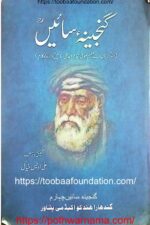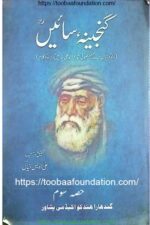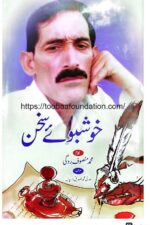-
TOOBAA RESEARCH BLOG ENGLISH BOOKS
☆THE NOBLE QURAN
(ENGLISH TRANSLATION)
☆URDU TRANSLATION OF QURAN
KNOWN AS : MOUZUH E FURQAN
BY: HAZRAT SHEIKH UL HIND
ALLAMA MAHMOOD HASSAN DEOBANDI
☆URDU TAFSEER (COMMANTERY)
KNOWN AS: TAFSEER E USMANI
BY: SHEIKH UL ISLAM ALLAMA SHABBIR AHMED USMANI
☆ENGLISH TRANSLATION BY:
MUHAMMAD ASHFAQ AHMED
Presented By : TOOBAA RESEARCH LIBRARY
……………………..
The Abridged Shamail e Tirmizi
Author: Muḥammad ibn Īsá Tirmidhī
With Notes from Sheikh ul Hadeez Moulana Mohamad Zakariya
And Mufti Ahmed E. Bemat
Translated by: Murtaz Hussain F. Quraishi
Presented By : TOOBAA RESEARCH LIBRARY
………………………………..
THE GREATEST BENEFACTOR OF MANKIND OF HUMAN RIGHTS
☆Muhsin e Insaniyat S.A.W aur Insani Haqooq
Khutbaa Hajaa tul Widaa se istshhad(URDU)
WRITTEN BY: DR Hafiz MUHAMMAD SANI (THANI)
preface : Dr Allama Muhadizz Abdul Haleem Chishti sb
Translated by: ZAHARA BAINTNER
GERMAN NAME: SABINE BAINTNER
Presented by: TOOBAA RESEARCH LIBRARY
………………………….
BY : KAUSAR NIAZI
PRESENTED BY : TOOBAA RESEARCH LIBRARY
………………………….
(SIRAT- US – SIDDIQ)
THE FIRST CALIPH OF ISLAM
BY: Nawab Sadr Yar Jung Bahadur
Maulvi Muhammad Habibur Rahman Khan Sharwani
Translated by: SYED MOINUL HAQ
RESENTED BY: TOOBAA RESEARCH LIBRARY
………………………..
(THE SECOND CALIPH OF ISLAM)
AL FAROOQ – VOL 2
AUTHOR: ALLAMA SHIBI NOUMANI
TRANSLATED BY: MUHAMMAD SALEEM
PRESENTED BY: TOOBAA RESEARCH LIBRARY
………………………..
IMAM ABU HANIFAH LIFE AND WORK
(SEERAT U NOUMAN)
AUTHOR: ALLAMA SHIBLI NOUMANI
TRANSLATED BY: M. HADI HUSSAIN
PRESENTED BY: TOOBAA RESEARCH LIBRARY
……………………
THE POLITICAL THOUGHT OF IBN TAYMIYAH
BY : PROF QAMARUDDIN KHAN
PRESENTED BY : TOOBAA RESEARCH LIBRARY
…………………………………..
(TAWEEL UL AHADEEZ)
BY: SHAH WALIULLAH
RENDERED INTO ENGLISH
BY: PROF G. N. JALBANI
PRESENTED BY : TOOBAA RESEARCH LIBRARY
…………………………
BY: IMAM SHAH WALIULLAH DEHLVI
RENDERED INTO ENGLISH
BY: PROF G. N. JALBANI
PRESENTED BY : TOOBAA RESEARCH BLOG
…………………………………………
A SAINT-SCHOLAR OF MUSLIM INDIA
AUTHOR: A. D. MUZTAR
Presented by: TOOBAA RESEACRH LIBRARY
…………………………….
Author: DR. A. J. HALEPOTA
(Professor of comparative religion and Islamic culture, University of Sind. & Ex. Chairman Council of Islamic ideology Pakistan )
Presented by: TOOBAA RESEACRH LIBRARY
……………….
RESEARCH PAPER FOR: PhD
RESEARCH by: TASADDUQ HUSAIN
ALIGARH MUSLIM UNIVERSTY INDIA
REPRESENTED BY: TOOBAA RESEARCH LIBRARY
…………………..
ENGLISH TRANSLATION
BY : C. R. TYSER, B. A. L. + D. G. DEMETRIADES, +
ISMAIL HAQQI EFFENDI
FOREWARD BY : JUSTICE S. A. REHMAN
PRESENTED BY : TOOBAA RESEARCH LIBRARY
………………………….
BY : MAULANA TAQI AMINI
PRESENTED BY : TOOBAA RESEARCH LIBRARY
…………………
FREE DELIVERY
When ordering from $500.








